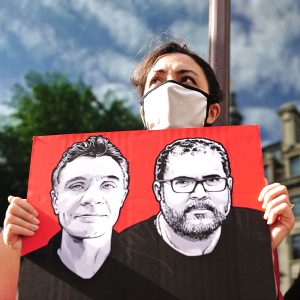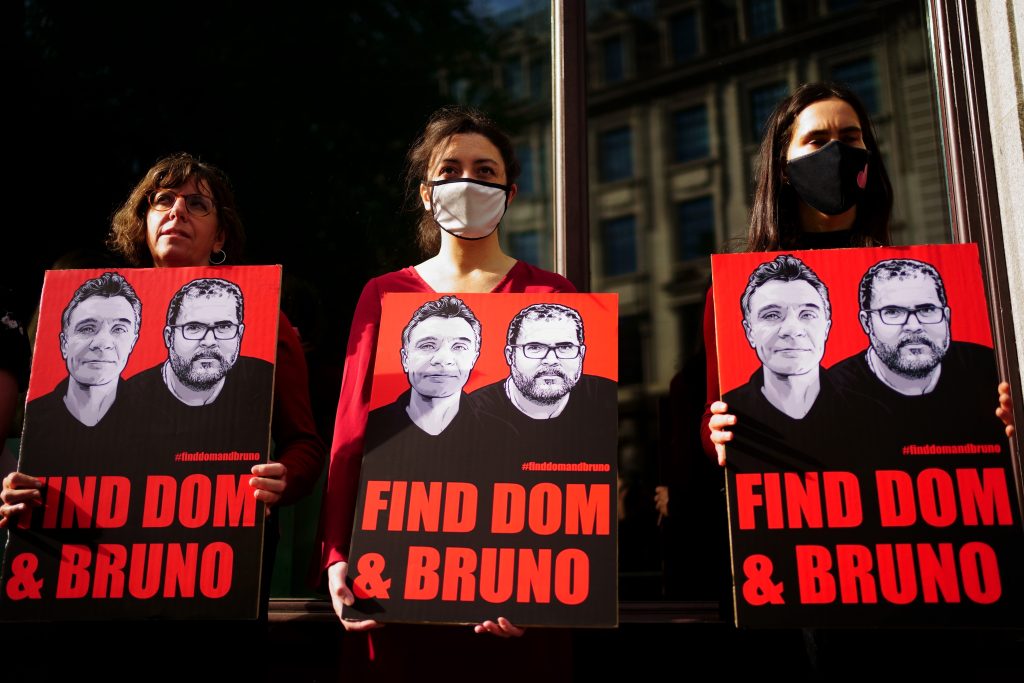16 Jun 2022 | Brazil, Opinion, Ruth's blog, United Kingdom

A vigil held for Dom Phillips and Bruno Araujo Pereira. Photo: Victoria Jones/PA Wire/PA Images
On Friday 16 June 2016, my beautiful and kind former colleague Jo Cox was murdered for no reason other than she was doing her duty, representing the people of Batley and Spen as a Member of the British Parliament to the best of her ability. Jo was a democrat, a wife, a mother, a daughter, and a friend to lots of us.
When we lost her, the foundations of our democracy were shaken but her legacy cannot and must never be defined by the heart-breaking and evil events of 16 June. Her family will not allow it, and neither must we.
Having said that I woke up this morning feeling a little sick and very sad. I’m honestly not sure that this day will ever be easy for those people that knew and loved Jo, but as I had my morning cuppa and listened to the news, every story reminded me not of her murder but of how angry she would have been about each news item and how determined and driven she would have been to make a difference. Because that’s who she actually was.
Jo’s legacy is not her murder but her love. It’s not the hate-filled extremist that stole her from us, it’s her determination to leave the world in a better place than she found it. It’s not the silence she left behind but rather the laughter and words she gave us. Which drive so many of us today.
That’s her legacy, which has been embraced by her family and institutionalised by the Jo Cox Foundation. And today as we remember Jo, we cannot forget the instructions she gave us to make the world better.
Which brings me to two more families who are in mourning today – those of Dom Phillips and Bruno Pereira.
Once again two people have seemingly been killed for refusing to be silenced. For refusing to take the easy route. For standing up for those people whose voices aren’t as loud.
Dom Phillips was a brave and inspirational journalist, determined to not only tell the stories of indigenous people affected by climate change but to offer solutions for how we could help save the Amazon. His death in the Brazilian rainforest must not be allowed to define his life or his legacy. He is so much more than the people who have silenced him.
But today my thoughts and prayers are with those who are struggling with their grief – as they seek to make sense of these horrors.
The only words I can give are those of Jo. She left us with one core premise – we have more in common with each other than the things that divide us. Whether that’s across the political aisle, or in every one of our communities, this basic fact of our collectively humanity is something that we must hold onto.
10 Jun 2022 | Brazil, News and features

Supporters at a vigil outside the Brazilian embassy in London for Dom Phillips and Bruno Araujo Pereira. Credit: Victoria Jones/PA Images
Another day in Brazil without any news of British journalist Dom Phillips and Bruno Araújo Pereira. The pair have been missing in the Vale do Javari region, in the Brazilian Amazon, since 6 June. They were last seen as they left the São Rafael riverside community, on their way to the city of Atalaia do Norte.
Phillips, a journalist who writes for the Guardian, has lived in Brazil for almost 15 years. Passionate about the Amazon, the largest rainforest in the world, he has travelled extensively in the region, covering, among other subjects, the environmental crisis in Brazil and issues that plague indigenous communities. At the time of his disappearance he was working on a book about the environment, with support from the Alicia Patterson Foundation. Pereira, a long time official of Brazil’s Indigenous rights organisation, is a former employee of the National Foundation for the Indian (FUNAI), an agency of the Brazilian government.
Both were travelling by boat on the Itaquaí River, in the Vale do Javari region, which is close to the border with Peru. Index spoke to Paulo Marubo, executive director of the Union of Indigenous Organizations of the Javari Valley (Univaja), who was one of the last people to see the pair. He said they were there visiting Univaja’s team on the border of the indigenous reserve. On Saturday, they were all threatened by a group of miners and developers, carrying guns.
“Dom even took a photo of these gangs (showing their guns), which got lost with his disappearance, and they left indignant about it. On Sunday they went out and stopped at a village called São Rafael, where they looked for a man called Churrasco to deal with a lake management project. But he wasn’t there. After they left, we didn’t hear from them anymore,” Marubo told Index.
Marubo said that those at the forefront of indigenous movements often receive threats. He added that the developers feel supported by the current Brazilian president, Jair Bolsonaro, who does not help the indigenous population or protect the lands that are being destroyed. Thus, they operate in a situation where Univaja constantly fight with the state, not just criminal gangs.
“An example of this is Bruno himself, who asked for a license from the current government, which is anti-indigenous,” he said.
In a statement from Tuesday, Bolsonaro, who has not hidden his support of development projects in the Amazon, blamed the missing men rather than the gangs that operate out of the Amazon and make it so dangerous.
“Two people in a boat, in a completely wild region like this, is an adventure that isn’t recommendable for one to do,” he said. “Anything could happen — an accident could happen, they could have been executed — anything.”
The executive coordinator of Univaja has also been targeted by a fisherman, known as Nei, who was interrogated and released by the police after the disappearance of Phillips and Pereira.
In the region where they disappeared, many riverside peoples live, in places that are difficult to access. These areas are rife with crime, such as drug trafficking and illegal deforestation, commanded not only by Brazilians but also by Peruvians and Colombians. All these groups seek absolute control of the region, so the risk to the lives of those who speak out against them or fight for the preservation of the Amazon is high. In Pereira’s case, he had already been threatened by loggers and even fishermen.
There are many examples that show the difficulties and dangers that plague the Amazon region. One of the most famous to date is the murder of the activist Chico Mendes, on 22 December, 1988. An active voice in the struggle to preserve the Amazon, Mendes was frequently threatened by powerful local landowners. Three days before Christmas in 1988, when he was getting ready to take a shower at his home in Xapuri, Acre, he was murdered by Darci Alves, who shot him in the chest. Alves was the son of an influential developer in the region.
The murder of indigenous people has sadly become a devastating trend in Brazil recently. In April, the Pastoral Land Commission released a report revealing that 109 indigenous murders were registered in the country in 2021.
At the same time, the situation for journalists is deteriorating. According to the Brazilian Association of Investigative Journalism (Abraji), from 2019 to May 2022 attacks against press professionals grew by 248%. In 2021, 453 attacks were counted, with Bolsonaro being accountable for 89 verbal insults to journalists.
“The situation is worsening. In 2018, when I was reporting on the elections for governor in Rio Grande do Sul (in Brazil’s south) with two other female journalists from a traditional left-wing paper, some Bolsonaro’s supporters approached us trying to see what we were writing, trying to get my badge to look for me on social media, a very hostile atmosphere,” said Filipe Strazzer, a journalist who at the time was working for the newspaper O Estado de São Paulo, one of the most important in Brazil.
“About environmental issues, I wouldn’t be brave enough to report on that. The Amazon is a lawless land, too many risks involved, powerful people who absolutely control it, so it makes me fearful, and you can’t really develop your work,” he said, remembering the famous case of the missionary Dorothy Stang. Born in the United States and with Brazilian citizenship, she was an environmental activist who was murdered in the Amazon, in the state of Pará, in February 2005. At the time, she was being threatened by rich farmers, landowners and loggers.
In the case of the disappearance of Phillips and Pereira, a search is underway. Around 250 people, mostly military personnel with experience in operations in a jungle environment, are participating in the search. Two aircraft, three drones and 20 vehicles are being used, according to Globo’s website.
But Marubo believes that this effort will not be enough to find them and that more needs to be done. The area is dense, difficult terrain and so they need to go into the lakes, into the forests, and not just stick to the main rivers, he said.
“I have asked the federal police to carry out the investigation in this way and not give up because otherwise these bandits will laugh in our face,” said Marubo.
In an open letter initiated by The Guardian and Washington Post, editors from around the world asked that the search be intensified and that the Brazilian government give more priority to the case.
“We ask that you urgently step up and fully resource the effort to locate Dom and Bruno, and that you provide all possible support to their families and friends,” the letter said.
We support this letter. The entire Index on Censorship team is hoping that Dom Phillips and Bruno Araújo Pereira will be found alive and that more priority will be given to promoting and protecting those defending land, and those reporting on it.
10 Jun 2022 | Belarus, Brazil, China, Hong Kong, Opinion, Philippines, Russia, Ruth's blog, Ukraine, United Kingdom, United States

This week has been awful.
The news has been devastating and all consuming. But that feels like it’s becoming the norm.
In Belarus, our friends remain under attack – Andrei and Irina’s trial began on Monday. We have no idea of the outcome.
In Brazil, Dom Phillips and his colleague Bruno Araújo Pereira remain missing – but with reports of fresh blood being found, our hearts break for their loved ones.
In Ukraine, we see daily the death and destruction caused by the Russian invasion, up to 200 Ukrainian soldiers killed a day. And the reports of cholera in Mariupol are beyond my comprehension in the twenty-first century.
In Russia, the crackdown against dissidents continues unabated – with limited coverage. 160 people are currently defending criminal cases for anti-war statements and this week a close associate of Alexei Navalny was tried in absentia and placed on the international wanted list.
In the Philippines, Ferdinand Marcos Jr has been elected as the next President and made his first visit to the US as President-Elect – seemingly the legacy of his parents no longer an electoral or diplomatic issue.
In Hong Kong, six brave democracy protesters were arrested for the temerity of marking the anniversary of Tiananmen Square.
In the US – the inquiry into the Capitol Riot is officially underway – highlighting just how fragile our collective democracy is and how desperately we need to cherish and protect it.
And that’s before I even touch on what is happening in the UK, the ongoing political crises, and the ideologically incoherent approach to freedom of expression protections.
And in too many countries this is now framed through the prism of a cost-of-living crisis as a scale that we haven’t seen for a generation.
My only comfort is that we know what is happening. In a digital age it is very difficult for any leader, however repressive, to completely silence dissent about their domestic actions. The joy of a free press in democratic countries is that it enables us to be informed and to demand more and better – from our own leaders and from those that claim a global role. It enables us to analyse the scale of the threat and to try and prioritise our efforts in assisting those brave enough to stand against tyranny.
Index exists to provide a platform for the persecuted. We work every day with those who refuse to be silenced. The least we can do is listen to them and then join their fight.
6 May 2022 | News and features, Pakistan, Syria, United Arab Emirates
Syria has become the latest country to implement new far-reaching cybercrime legislation that goes beyond what is necessary to keep the internet safe.
On 18 April, Syrian president Bashir al-Assad announced new laws that could result in harsh penalties criticising or otherwise embarrassing the Syrian government.
Anyone breaking the law can be jailed for up to 15 years and face penalties up to S£15 million (£23,000).
The highest fines and sentences are reserved for “crimes against the Constitution” and for undermining the prestige of the State including websites or content “aiming or calling for changing the constitution by illegal means, or excluding part of the Syrian land from the sovereignty of the state, or provoking armed rebellion against the existing authorities under the constitution or preventing them from exercising their functions derived from the constitution, or overthrowing or changing the system of government in the state”.
Publishing what the new law describes as “fake news…that undermines the prestige of the state or prejudices national unity” can lead to five-year jail sentences and S£10 million (£15,300) fines which seems to target bloggers and digital activists who publish criticism of the government online.
In a statement the Gulf Centre for Human Rights (GCHR) said the law could be used to violate many of the basic digital rights of citizens, especially freedom of expression and freedom of digital privacy.
It said, “GCHR believes that the law should be reviewed and its definitions defined more clearly to ensure the existence of a strong and practical law that does not violate the basic rights of citizens, but rather contributes to creating a free and accessible internet in which diverse opinions are respected and human rights are protected and promoted.”
The new law also obliges internet service providers to save internet data for all users for a period of time to be determined by the competent authorities.
The GCHR calls this “a flagrant violation of the digital privacy of citizens and provides ease of access by security services to all information related to peaceful online activists”.
The Syrian cybercrime law is just the latest in a growing body of legislation around the world ostensibly used to target cybercrime but clearly intended to stifle legitimate criticism and restrict freedom of expression.
According to the United Nations Conference on Trade and Development, 81% of countries have now implemented cybercrime legislation with a further 7% with draft legislation.
Many argue that cybercrime legislation makes the internet a safer place but many countries with human rights are under attack, including Brazil, Myanmar and the UAE, are using such legislation to silence critics.
In January, the United Arab Emirates adopted new legislation that promised fines of up to AED100,000 and jail terms of up to a year for “anyone who uses the internet to publish, circulate or spread false news, rumours or misleading information, contrary to the news published by official sources”. These penalties are doubled when publication happens “during times of pandemic, crises or disasters”
Attempts to introduce such draconian legislation are being resisted by human rights and journalism associations.
In February this year, the Pakistani government passed an ordinance amending the Pakistan Electronic Crimes Act, 2016. Of particular concern was an expansion of the “offences against dignity” section of the legislation to cover the publication of “false” information about organisations, companies and institutions, including the government and military.
However, in April, the Islamabad High Court, following challenges by the Pakistan Federal Union of Journalists and the Pakistan Broadcasters Association, threw out the ordinance. The court noted: “Freedom of expression is a fundamental right and it reinforces all other rights guaranteed under the Constitution … [and] free speech protected under Article 19 and the right to receive information under Article 19-A of the Constitution are essential for development, progress and prosperity of a society and suppression thereof is unconstitutional and contrary to the democratic values.”



